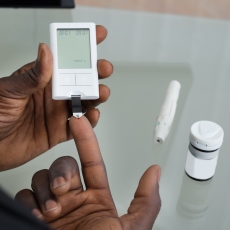
What is blood glucose?
Blood glucose, or blood sugar, is the main sugar found in your blood. It is your body's primary source of energy. It comes from the food you eat. Your body breaks down most of that food into glucose and releases it into your bloodstream. When your blood glucose goes up, it signals your pancreas to release insulin. Insulin is a hormone that helps the glucose get into your cells to be used for energy.
For people with diabetes, your body doesn't make enough insulin, can't use it as well as it should, or both. Too much glucose stays in your blood and doesn't reach your cells.
- Hypoglycemia (National Library of Medicine)... and doesn't reach your cells. What is hypoglycemia? Hypoglycemia means low glucose. It happens when the level ... you. For people who don't have diabetes, hypoglycemia is typically a blood glucose level lower than ...
- ... The medical name of low blood sugar is hypoglycemia. ... nlm.nih.gov/34964868/ . Cryer PE, Arbeláez AM. Hypoglycemia. In: Melmed S, Auchus RJ, Goldfine AB, Koenig RJ, ...
- ... level in newborn babies is also called neonatal hypoglycemia. It refers to low blood sugar (glucose) in ... to take in enough glucose by feeding. Neonatal hypoglycemia occurs when the glucose level of a newborn ...
- ... can make your blood sugar level too low (hypoglycemia). A high blood insulin level causes a low blood sugar level ( hypoglycemia ). Hypoglycemia may be mild, leading to symptoms such ...
- Low blood sugar is called hypoglycemia. A blood sugar level below 70 mg/dL (3.9 mmol/L) is low and can harm you. A blood sugar ... talking to your provider or nurse first. Sometimes hypoglycemia can be due to accidently taking the wrong ...
- ... how to: Recognize and treat low blood sugar ( hypoglycemia ) Recognize and treat high blood sugar ( hyperglycemia ) Plan ... you are having symptoms of low blood sugar (hypoglycemia) After you eat out, particularly if you have ...
- Hypoglycemia (Mayo Foundation for Medical Education and Research)Hypoglycemia/Start Here ... Hypoglycemia ... Mayo Foundation for Medical Education and Research
- ... liver and poor liver function) Low blood sugar ( hypoglycemia ) -- most common reason Multiple endocrine neoplasia type I ( ... people that are at higher risk of severe hypoglycemia that can be dangerous. Glucagon can be increased ...
- Overview of hypoglycemia, also called low blood glucose or low blood sugar, among people with diabetes. ... Hypoglycemia, low blood sugar, low blood glucose, diabetes, glucagon, insulin, insulin shock, insulin reaction, hypoglycemia unawareness, nocturnal ...
- Low blood sugar (hypoglycemia) is common in people with diabetes who are taking insulin or other medicines to control their diabetes. Other than ...



